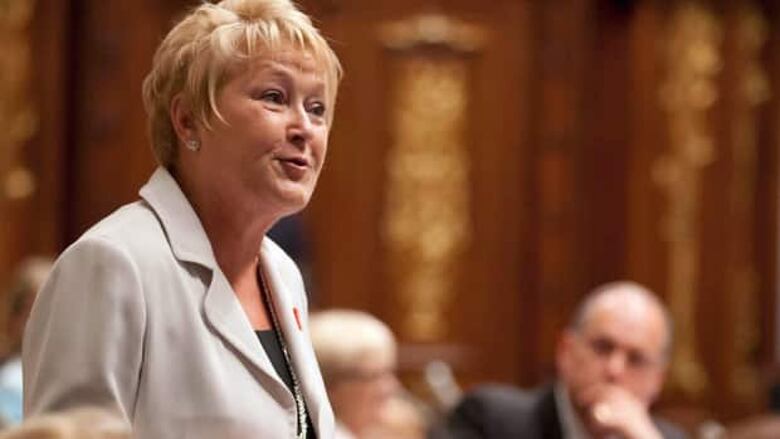Parti Québécois leader Pauline Marois

Five years after taking over as Parti Québécois leader, Pauline Marois faces the political battle of her career in this election.
Can Marois, the doyenne of Quebec’s separatist movement, capitalize on public disaffection with the Liberal government?
Can she tame the mercurial factions that make up Quebec’s sovereigntist troops — the key to deliver a PQ electoral victory?
It’s a tall order for Quebec’s Madame de Béton – the Cement Lady — as editorialists christened her earlier this year.
But Marois has shown steely political perseverance in her half-decade as PQ leader, weathering party infighting, desertions, stagnant popularity in the polls and the spectre of former Bloc Québécois leader Gilles Duceppe.
'The biggest risk to Quebec isn’t sovereignty. It is staying in Canada.' —PQ Leader Pauline Marois
Since she was anointed PQ leader in 2007, Marois has deftly steered the party back to its social democratic roots, exemplified most recently by unwavering PQ member support for striking students in the tuition protest movement.
She captained two years of steady opposition pressure on the Liberal government at Quebec’s national assembly in the continuing public works corruption scandal.
Marois appeased nationalist hardliners with her pledge to expand Quebec’s Bill 101 language law and to create a Quebec citizenship charter to promote "common values" and secularism in the province.
And while Marois, in her early days as PQ leader, distanced herself from the sovereignty referendum issue, she has come full circle.
With the ascent of Stephen Harper's Conservative government in Ottawa, Marois found a new foil for Quebec's independence: Ottawa's unpopular, right-wing policies.
Sovereignty is once again the PQ's key objective.
"The biggest risk to Quebec isn’t sovereignty," she told supporters this spring. "It is staying in Canada."
Big PQ players walked away under Marois
Whether Marois can galvanize Quebec's fractured sovereigntist movement remains to be seen.
Several party veterans have walked away recently, notably Louise Beaudoin, Pierre Curzi and Lizette Lapointe. They publicly denounced Marois in the controversy swirling around the construction of a new hockey arena in Quebec City.
Some defectors have joined the PQ’s nemesis, Coalition Avenir Québec, the no-referendum-for-a-decade upstart party led by former PQ cabinet minister François Legault.
Other PQ veterans walked away to sit as independents or have formed their own political parties. (Jean-Martin Aussant founded the Option Nationale).
Marois has drawn media-savvy star candidates to her fold, including former Radio-Canada journalist Pierre Duchesne and Jean-François Lisée, an analyst and former advisor to two PQ premiers.
Critics say Marois should have enjoyed sky-high poll numbers these past years, given the looming depth of discontent towards the Liberal government. It hasn't happened.
And that could prove to be Marois's greatest campaign challenge — how to draw sovereigntists into her camp this time around.
First female PQ leader boasts unequalled experience
Marois, 63, is among the most tenacious and successful Quebec politicians in history and a trailblazer for women in public office.
As the first woman leader of any Quebec political party, she brought decades of legislative and executive experience to the job.
Her public track record is linked intimately to Parti Québécois history and includes 15 cabinet positions under four former premiers (René Lévesque, Lucien Bouchard, Jacques Parizeau and Bernard Landry.)
From her first stint as press secretary in the 1970s to Quebec’s then-finance minister Parizeau, to overseeing education, health and finance portfolios, Marois has been involved in the province's trademark social programs.
She helped draft Quebec's progressive youth protection legislation in the 1980s and engineered the province’s envied low-cost daycare system.
Her first bid for the PQ leadership failed in 1985, when she ran and lost against Pierre-Marc Johnson in a race to replace Lévesque.
A second leadership bid in 2006 ended with her retirement from politics after party members picked André Boisclair, a young upstart ex-cabinet minister.
Following the PQ's disastrous performance in the 2007 elections, Marois returned to public life to take over the party.
She briefly faced a formidable opponent, Gilles Duceppe, who bowed out of the race just 24 hours after declaring his candidacy. Marois was acclaimed.
Her personal wealth has been publicly scrutinized. She and her husband Claude Blanchet sued the Montreal Gazette for defamation over a 2007 investigation that raised questions about their former multimillion-dollar home on Île-Bizard.
The case was settled out of court.
Marois has four children: Catherine, Félix, François-Christophe and Jean-Sébastien.